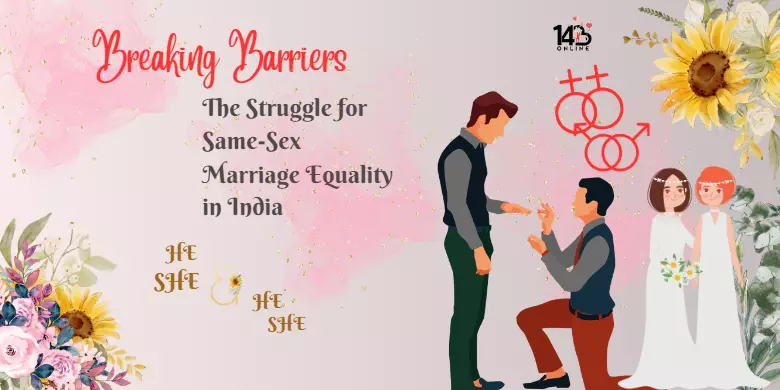In this article, we will explore the challenges faced by same-sex couples in India in their struggle for same sex marriage equality, the impact of the fight for same-sex marriage on the LGBT community in India, and the current state of marriage equality in the country.
The Challenges Faced by Same-Sex Couples
Same-sex couples in India face a multitude of challenges in their fight for marriage equality, including societal stigma, legal roadblocks, and religious opposition.
One of the most significant challenges facing same sex couples is the legal status of their relationships.In India same sex relationships are not recognized by law and therefore same sex couples are not eligible to marry.
In addition to legal barriers same sex marriage couples also face significant societal stigma and discrimination. Many people in India view homosexuality as immoral and same sex couples often face harassment, discrimination and violence.
The Benefits of Legalizing Same-Sex Marriage
Legalizing same sex marriage case in India would provide same sex couples with access to the same legal rights and privileges as heterosexual couples. It would also help to reduce stigma and discrimination against the LGBT community and would provide legal recognition and protection for same sex couples & their families.
In addition legalizing same sex marriage would help to promote gender equality in India. It would challenge traditional gender roles and expectations would help to create a more inclusive and accepting society for all individuals, regardless of their sexual orientation or gender identity.
The ImpThe current state for Same-Sex Marriage Equality in Indiaact on the LGBT Community
Recently, a group of 18 LGBTQ+ couples in India bravely stood up and filed a lawsuit, seeking legal recognition of their relationships under the Special Marriage Act, regardless of their gender identity or sexual orientation. This is a major step forward in the ongoing struggle for equality in India, as the Supreme Court begins to hear petitions for the legalization of same-sex marriage. Advocates for the LGBTQ+ community rightly argue that denying marriage rights to same-sex couples is a violation of their fundamental human rights. The recent landmark ruling in Taiwan, legalizing same-sex marriage, has given renewed hope to many in South Asia who have been fighting for equality for years.
India has a complicated history when it comes to laws regarding same-sex marriage and LGBTQ+ rights. A significant case in this regard is Navtej Singh Johar v. Union of India which challenged Section 377 of the Indian Penal Code that criminalized homosexuality. In 2018, the Supreme Court declared Section377 unconstitutional, which was a monumental win for the LGBTQ+ community in India.This decision means that individuals are free to engage in consensual same-sex relationships but they still cannot legally marry. However, this ruling has opened the door for progress towards equal rights and several petitions have been filed to legalize same-sex marriage in India.
There is an ongoing debate in India about same sex marriage supreme court about legalizing same-sex marriage hearings. Opponents argue that the current Marriage Act does not recognize same-sex couples. However, recent case law in India has provided an avenue for legalizing same-sex marriage. A case currently being heard in the Supreme Court of India involves 18 LGBTQ+ couples & their families who are fighting for legal recognition of their relationships. The couples argue that their sexual orientation should not be a reason for them to be denied the same legal rights as heterosexual married couples and parents. The arguments made by these lawyers are similar to those made in other countries where same-sex marriage has been legalized.
Arundhati Katju, a lawyer representing LGBTQ+ couples has argued that denying them the same rights as straight married couples is against societal values and customary practices.In an affidavit, she strongly opposes the government’s decision to reject pleas from same-sex partners seeking legal recognition of their relationships. Although there is opposition to the move towards legalisation from those who are against same-sex marriage the Indian Supreme Court has taken note of these petitions and is currently hearing arguments from bothsides. Senior advocate Abhishek Manu Singhvi is representing one of the petitioners, Kavita Arora, who married her partner in 2016. However, their marriage was not recognized by law as they are a same-sex couple. Kavita Arora and Ankita Khanna are among those fighting for equal rights for all citizens, regardless of their gender identity or sexual orientation.
Although the Indian Constitution recognizes the right to equality the LGBTQ+ community still does not enjoy this right. Same-sex couples are not permitted to adopt children and they are not afforded the same legal protections and benefits as heterosexual couples, including joint property ownership and inheritance rights. Opponents of same-sex marriage often argue that it goes against traditional values and religious beliefs. On the other hand, the argument for legalizing same-sex marriage is grounded in the belief that everyone should have the freedom to love and commit to whomever they choose regardless of gender.
Conclusion
The current legal battle for same-sex marriage in India marks a significant moment in the fight for LGBTQ+rights. The denial of marriage rights to same-sex couples is a form of discrimination and a violation of their basic human rights. By legalizing same sex marriage in India not only would same-sex couples be entitled to the same legal benefit and protections as opposite-sex couples but it would have positive impact on their mental health, overall well-being. It is time for India to recognize the rights of all its citizens regardless of their sexual orientation or gender identity.
You may also like to read: Love Knows No Boundaries: Celebrating LGBTQ+ Acceptance

1. What is the recent development regarding same-sex marriage in India?
Answer: 18 LGBTQ+ couples filed a lawsuit seeking legal recognition of their relationships under the Special Marriage Act.
2. Why do advocates for the LGBTQ+ community argue for legal recognition of same-sex marriage?
Answer: They argue that denying marriage rights to same-sex couples is a violation of their fundamental rights.
3. What recent ruling in Asia has given hope to the LGBTQ+ community in South Asia?
Answer: The ruling in Taiwan that legalized same-sex marriage.
4. What was the significance of Navtej Singh Johar v. Union of India case?
Answer: This case challenged Section 377 of the Indian Penal Code which criminalized homosexuality. In 2018, the Supreme Court declared Section 377 unconstitutional, thereby decriminalizing homosexuality.
5. Can same-sex couples legally marry in India after the decriminalization of Section 377?
Answer: No, same-sex couples are not allowed to legally marry in India.
6. Who is currently fighting for the legalization of same-sex marriage in India?
Answer: Lawyers representing 18 LGBTQ+ couples and their families are currently fighting for legal recognition of their relationships.
7. What is the argument for legalizing same-sex marriage?
Answer: The argument is based on the idea that all individuals have the right to love and commit to whoever they choose, regardless of their gender.
8. Why do some people oppose same-sex marriage?
Answer: Some people oppose same-sex marriage on the grounds that it goes against traditional values and religious beliefs.
9. What are some of the legal protections and benefits that same-sex couples are currently denied in India?
Answer: Same-sex couples are not allowed to adopt children, and they are not entitled to the same legal protections and benefits as opposite-sex couples, such as inheritance rights and joint property ownership.
10. What would be the impact of legalizing same-sex marriage in India?
Answer: Legalizing same-sex marriage would not only provide same-sex couples with legal protections and benefits but also have a positive impact on their mental health and well-being.
You may also love to read
Crafting Memories: DIY Indian Wedding Card Ideas for a Personal Touch!

